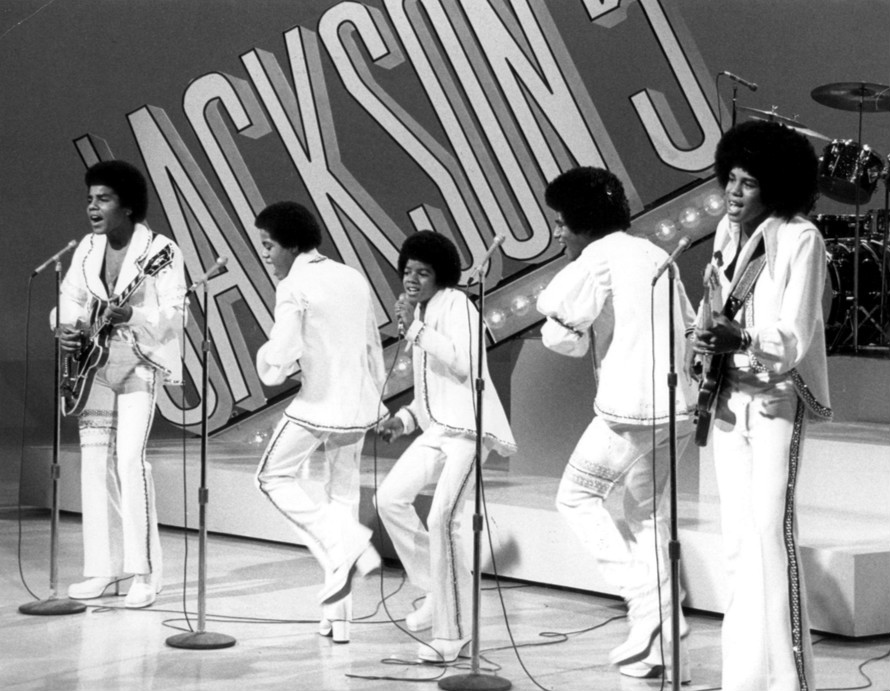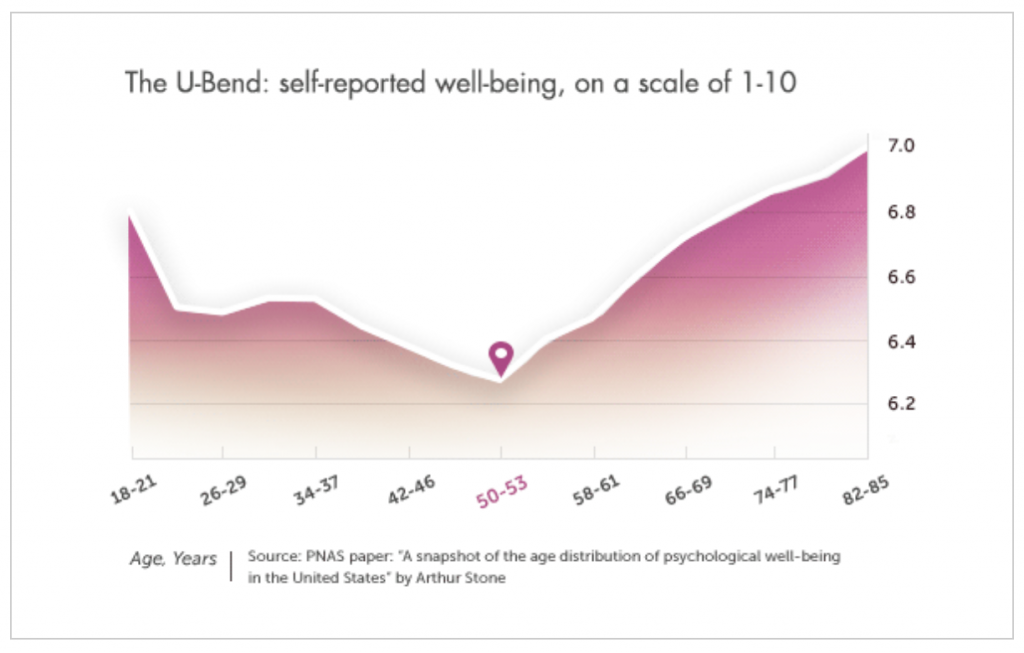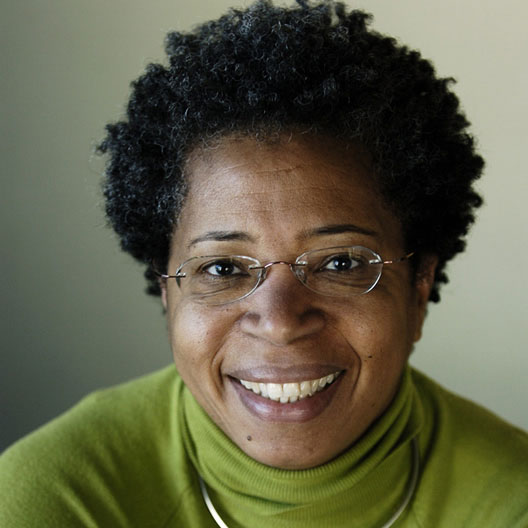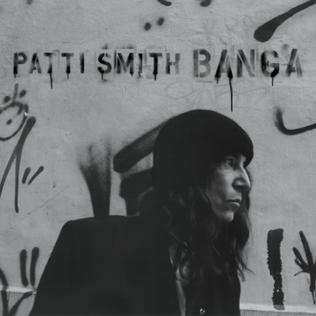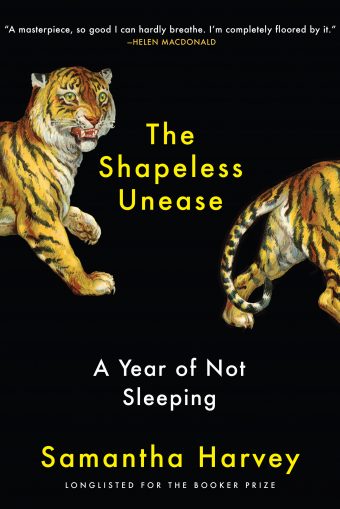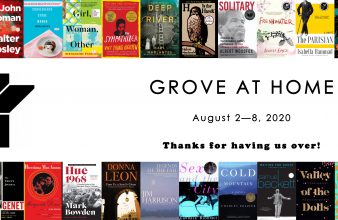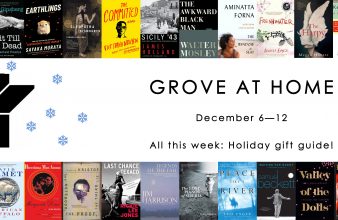News Room
Welcome to Grove at Home!
Every weekday, from now until we’re all out of the house again, we’ll be sharing a couple of links — some fresh, some from the vault — to say hi, remind you to keep reading, and let you know what’s on our minds. This week, we’re revisiting some of our favorite posts from the past few months. Worth a second look, and definitely not to be missed!
Friday, August 21
Allan J. Lichtman knows who will win the presidential election
When nearly all the pundits and pollsters called the 2016 presidential election wrong, one man — American University history professor Allan J. Lichtman — called it right. In fact, Lichtman, using a system of his own device called “keys to the White House,” has accurately called every U.S. presidential election for the past forty years. In a video produced earlier this month by the New York Times, Lichtman introduces himself (and a colorful personal history that includes winning four cars on “Tic Tac Dough”), and then breaks down the current state of the 2020 election, declaring his prediction for the outcome. Bear in mind as you watch: he’s never been wrong.
Michael Thomas: “[Michael Jackson’s] death… makes me scan time backward and forward in order to understand, how he, we, came to be here now.”
This summer, the world marked eleven years since the death of Michael Jackson — a pop king whose inordinately complex legacy we needn’t delve into here. But it was a great moment to re-read a truly extraordinary piece of writing: Michael Thomas’s “I Was Not Michael Jackson,” a powerful essay on loss, family, Blackness, and, indeed, Michael Jackson, published a few days after the star’s death by the New York Times. Just two years earlier, Thomas’s novel Man Gone Down had swept a series of honors: the New York Times declared it one of the Ten Best Books of the Year, it won the International Dublin/IMPAC Literary Award, and more. Today, while Jackson remains as difficult a figure to approach as ever, Thomas’s essay still finds away, seeing in the singer a reflection of the older brother who “took the qualities that made our father charismatic, and made them petty.”
“I was driving home listening to the radio on Thursday when I heard that Michael Jackson was dead. I turned it off and thought about my brother. It’s not that I don’t think about him I suppose I could say that though he’s only sometimes on my mind, he’s always in it. He moves, or I move him, from an impressionistic figure in a background to a man in sharp focus.” Continue reading…
“In chitchat and jest / I feel caressed by every word”
Gaston Dorren loves language — as much is clear from his books, like Lingo and Babel. And as love has done since time immemorial, Dorren’s love of language sometimes moves him to song. Here’s his video for “Mother Tongue,” a song he wrote and performs. Not only can the guy tell you fascinating things, like how Vietnamese transforms French words in borrowing them (“lơ” is the Vietnamese borrowing of the French “bleu,” “sâm banh” is “champagne,” “moutarde” becomes “mù tạc,” etc.) — turns out he can carry a tune, too.
Thursday, August 20
Sandra Newman reads with Charlie Jane Anders
It may sound like a dream, but as recently as 2019, authors were able to safely tour the United States, reading from their books and meeting their readers. Early last year, the incredible Sandra Newman did just that, reading from her breathtaking novel The Heavens, alongside Charlie Jane Anders, the brilliant author of The City in the Middle of the Night, at Politics and Prose in Washington, DC (who, by the way, are currently offering sales by mail and curbside pick-up). Sandra on genre: “Originally most stories are fantasy stories… And then we gradually invent realism — originally, largely as a way of pretending that something is a true story. Robinson Crusoe was originally sold as a true story, which was just a way of marketing books back in the eighteenth century. And then it turned out that people continued to enjoy those stories even once they knew that they weren’t true.” Yes!
“But back to sweatiness and insomnia”
A few years ago, a piece of writing appeared in O, the Oprah Magazine that quickly set the internet on fire. Ada Calhoun, already admired as the author of Wedding Toasts I’ll Never Give and St. Marks is Dead, had captured the subtleties of a malaise sweeping over so many Generation X women — raised on the promise of “having it all,” and now, at mid-life, facing down financial insecurity, overwhelming responsibility, a paucity of professional opportunities, and more. As countless readers found their predicament accurately described, with grace and humor, and passed the article along to friends, it spread around the internet like wildfire, becoming a major viral phenomenon. Earlier this year, we published the book that grew out of that article, Why We Can’t Sleep: Women’s New Midlife Crisis, and it became an instant New York Times Bestseller. If you’re interesting in getting a feel for the book — one that should be read by anyone who cares about the women of Generation X — you can start with the original viral essay, which rings as loud, clear, and timely today as when it was first published.
“Sometimes, I think I’m falling apart. Then, I talk to my friends. One spent a whole winter getting a babysitter for her toddler daughter in the middle of the day and then used the time to go to the movies and cry. I run into another and ask how it’s going with her kids’ father, whom, last I heard, she was fighting with. She fixes me with a blank stare. ‘I’d leave,’ she says, ‘if I had more money…’” Continue reading…
Gil Scott-Heron at Woodstock ’94
Fifty years ago, there was Woodstock. Lo, and it was good. Twenty-five years later, there was Woodstock ’94, and it, too, was good. (A few years after that came Woodstock ’99, which… we need not speak of.) Here’s a remarkable performance by the one and only Gil Scott-Heron. Enjoy!
Wednesday, August 19
Chef Edward Lee’s dish in honor of Jim Harrison: “Gluttony without finesse is barbaric”
In this online-only video shot for “The Mind of a Chef,” genius of cuisine (“cuisenius”?) Edward Lee prepares a dish in homage to his idol, the phenomenal writer (and legendary eater!) Jim Harrison. You are strongly cautioned not to watch this on an empty stomach! The dish combines oxtail crepinette, escargot, sweetbreads, foie gras, and more. Jim, we miss you every day, and we hope you can get a whiff of the aroma, wherever you are.
Dionne Brand: “I’ve developed an aversion to that word normal”
As so many of us dream of “returning to normal,” the Trinidad-born Canadian poet and intellectual Dionne Brand has written a stunning rebuke of some of the ideas of “normalcy” that may be implicit in those dreams. In a stunning piece for the Toronto Star — the paper of the city as whose poet laureate Brand has served — she weighs in trenchantly on neoliberalism, race, policing, and tremendously much more. A vital read, whatever country it finds you in.
“Was the violence against women normal? Was the anti-Black and anti-Indigenous racism normal? Was white supremacy normal? Was the homelessness growing on the streets normal? Were homophobia and transphobia normal? Were pervasive surveillance and policing of Black and Indigenous and people of colour normal? Yes, I suppose all of that was normal. But, I and many other people hate that normal.” Continue reading…
Patti Smith Sings of Pontius Pilate’s Dog
If you’ve read The Master and Margarita, you’ll surely remember the important role Pontius Pilate plays in the book’s action. You may also remember Pilate’s best friend in the book — his loyal pet, a dog named Banga. If you don’t already also know “Banga” as the title track off an excellent album released in 2012 by noted Jean Genet fan (and all-around genius) Patti Smith, check it out. “Loyalty lives in the heart of a dog” indeed!
Tuesday, August 18
Try some Bigfoot with your breakfast
California’s Great Bear Rainforest is a place where “you go into people’s backyards, and essentially it’s the forest.” Last summer, journalist John Zada appeared on Vancouver’s News 1130 to talk about his travels there, to explore both the rich mythology and elusive facts about the Sasquatch. The book that research was crucial to, In the Valleys of the Noble Beyond, is now available in paperback!
Lauren Francis-Sharma on the current state of parenting while black
In this heart-rending and profoundly eloquent essay published at the Washington Post’s The Lily, Lauren Francis-Sharma writes about the devastating challenges of raising black children in a country beset by white supremacy. However she’s tried to protect her children from the ugliest truth around them, Francis-Sharma writes, appalling realities break through — whether on the TV at a McDonald’s after a school dance, being called the n-word by a white classmate, or in the headlines that have now dominated American news for weeks. A powerful, short read.
“Silly me to think the quarantine might have a silver lining. Silly me for being secretly excited that here in my home, my girls would be protected. Silly me for believing that my inability, my unwillingness, my refusal to watch George Floyd’s killing would somehow transfer to my children. Silly me for believing the ugliest part of America wouldn’t try to have its way with my babies.” Continue reading…
Albert Woodfox on his Four Decades in Solitary and his Life Afterwards
Albert Woodfox survived more than forty years in solitary confinement, for a crime he didn’t commit. Finally released in 2016, the Black Panther Party member wrote the Pulitzer- and National Book Award-shortlisted memoir Solitary to describe how courage, hope, and solidarity sustained him. Last year, he discussed the book with Amy Goodman of Democracy Now!. “The purpose of solitary confinement is to destroy the human spirit, to destroy your sense of self-worth, to destroy your sanity… I’ve heard phrases like ‘no more than fifteen days.’ For me, one day in solitary confinement is too much.”
Monday, August 17
Shelagh Delaney’s Salford, by Ken Russell
In September 1960, legendary British filmmaker Ken Russell (“Altered States”) produced this astonishing short documentary for the BBC, considering the twenty-one-year-old playwright Shelagh Delaney and her life in Salford, England, where A Taste of Honey — the play with which she forever changed the landscape of British theater — is set. Far ahead of its time in its examinations of race, class, gender, sexuality, and more, A Taste of Honey is today an admired and influential classic.
Samantha Harvey on not Sleeping
In May, we published The Shapeless Unease, a singular memoir of sleeplessness by Samantha Harvey, who surely qualifies as one of the most inquisitive and eloquent writers to ever to document their own insomnia. At the time, Harvey published an essay in Time magazine about many things — attacks by the robot antagonists of Battlestar Galactica, George Saunders’s approach to fiction-writing, online meditation classes. But most of all, it was about uncertainty and, indeed, sleeplessness. You should read it.
“I dreamed a while back that Boris Johnson had died. In the dream I felt sad, and when I woke I felt glad that I’d been sad, that my compassion had extended to someone whose values I don’t generally share. I went back to sleep and dreamed that my partner had been cut in half lengthways by a Cylon…” Continue reading…
“I think the writing environment in China is the most unique and unusual in the world”
Yan Lianke has been called “China’s most feted and most banned author.” Emerging from the very humblest of origins, a poor village in the rugged terrain of China’s Henan Province, far from the nearest city, Yan has become a major voice in world letters, thanks to his political courage, keen interweaving of social critique with literary style, and what the New Yorker has called a “preternatural gift for metaphor [that] spills out of him unbidden.” We recently published our eighth book by Yan, his nonfiction debut in English, Three Brothers: Memories of my Family, translated by Carlos Rojas. Here, in an excellent interview for the Louisiana Channel, he speaks eloquently on a broad range of subjects: his rural upbringing, literary censorship in contemporary China, the nature of fear, and much more.

